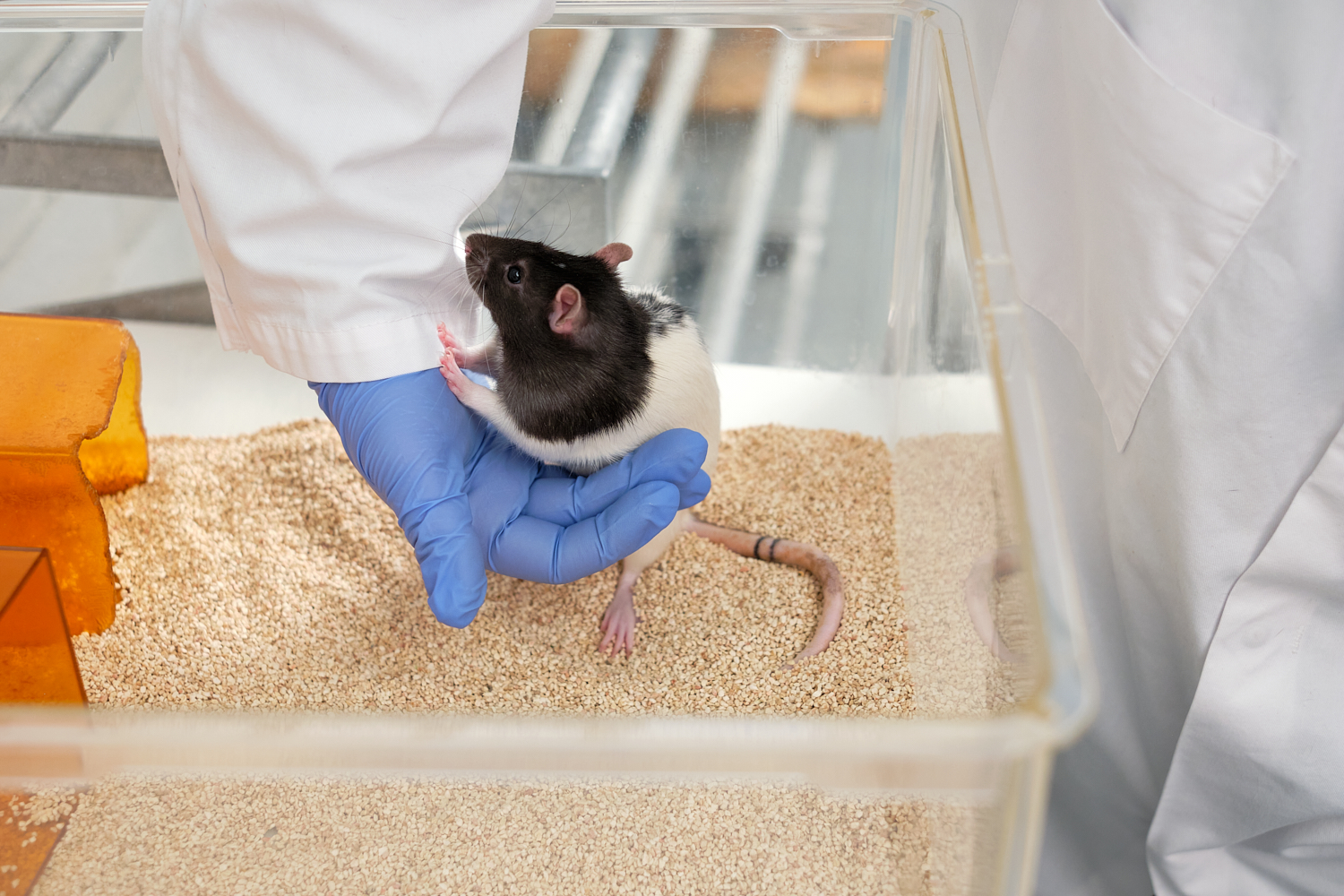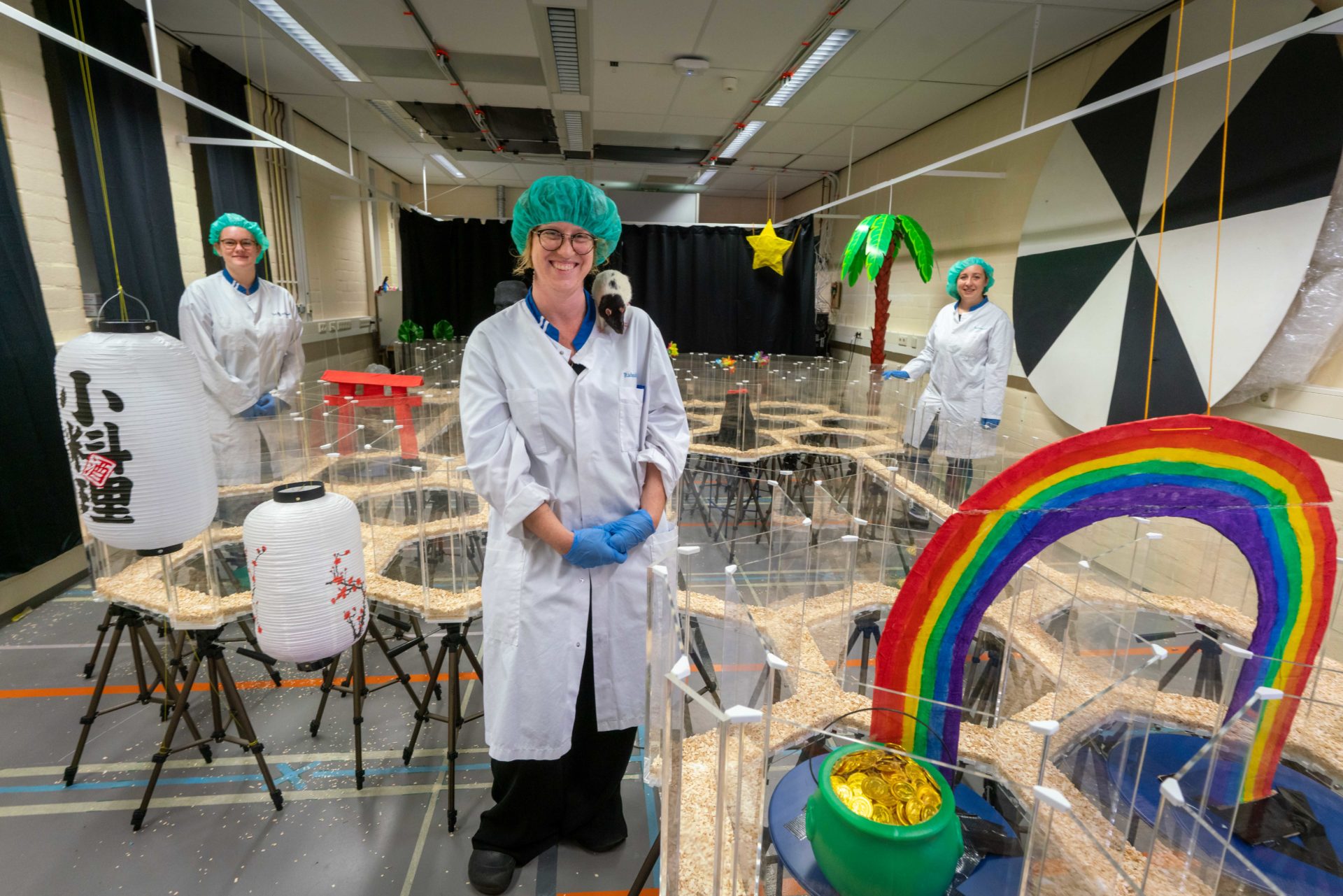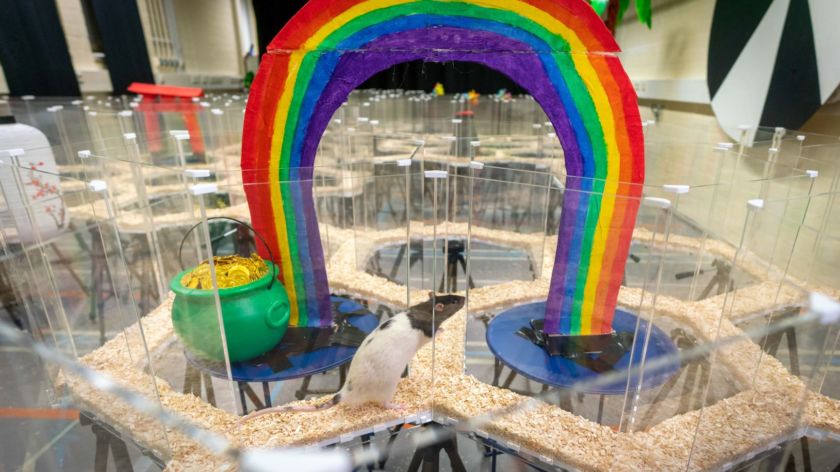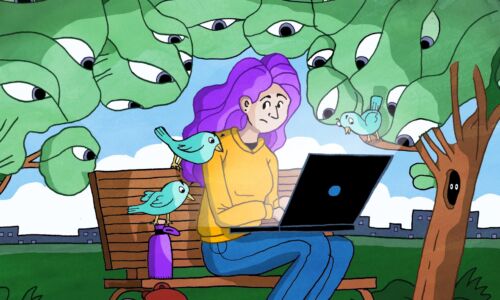Award for research with rats. ‘We want the animals to have a good life’
In the animal lab, neurobiologist Lisa Genzel tries to make the life of rats as enjoyable as possible. This is not only nice for the rats, it also helps her in her research to better understand the human brain. On Wednesday, Genzel is receiving the Radboud Science Award for her work.
Shoes off, Crocs and a hairnet on. ‘Do you actually have hamsters or mice at home?’ asks Lisa Genzel as she hands me a lab coat. ‘I should have asked you before, because if you do, you’re not allowed into the lab. You might bring in diseases.’ She leads the way through the corridors of the concrete building and opens the door to her research area.
The contrast with the rest of the building, or in fact with what you might imagine an animal lab looks like, could not be greater. The space is almost entirely filled with a huge maze made of transparent hexagons, adorned with colourful handmade objects.
At the front there is a rainbow with a pot of gold. On the rear right, an Easter Island statue. Plastic flowers are hanging from the ceiling, and there is a red Chinese temple. It definitely looks ‘cosy’.
Maze
Clearly, Genzel thinks so too. Radiant with pride, she starts talking about her research, and how this set-up forms the base for it. ‘We’re doing research on the long-term memory of rats, and how it is affected by sleep.’ Her research primarily focuses on better understanding the healthy brain. This helps researchers to also gain more insight into brain disorders such as ADHD, autism, Parkinson’s Disease, Alzheimer’s disease, depression, and anxiety disorders.
In order to achieve this, the researchers at this lab first let the laboratory animals walk around in the maze for a while, allowing them to create a map of it in their brain. Creating an imaginary map works in the same way in rats as in humans. Special ‘location cells’ are activated in the brain that tell us which room we are in, our exact location within it, and our orientation: are we facing left or right?

By using electrodes to wirelessly connect the rats’ brains to a computer, researchers can see these special brain cells light up one by one as the laboratory animals run through the maze. These data can then be compared with video material of the route followed by the rat. In this way, you can, as it were, visualise the map of the maze as it is plotted in the brain.
The researchers then place the rats at various locations in the maze. The rats go in search of treats, and over time, the researchers carefully observe how well the animals remember landmarks, such as spaces and decorations.
Genzel shows us some videos to illustrate this. And indeed, when a rat is released into the maze after a few days of training, it first wanders around for a while, but as soon as it sees a landmark, it accelerates and heads straight for the treat. This decision is so quick and purposeful that you can almost hear the rat think: ‘Ah! That’s where I am!’
Well-being
It may sound simple, but the study conducted in Genzel’s maze is highly complex. It makes it possible to carry out many new studies on the workings of the brain, which can in turn form the basis for new insights into brain disorders. This is one of the reasons why Genzel is receiving the Radboud Science Award for her work on Wednesday 28 September.
But it is not the only reason. In her research, Genzel is strongly committed to her laboratory animals’ well-being. For example, she does not use caloric restriction to stimulate the animals to train; instead, her team uses special treats that have proven to be effective. In addition, the rats are given enough space and lots of toys, and the researchers spend a lot of time engaging with them.
Also, her research is set up in such a way that the researchers can collect a lot of data using just a few rats. This makes a huge difference in terms of the number of laboratory animals required. Because although the advantages of animal research are clear – think of how the COVID-19 vaccine was developed – the Netherlands is by and large critical of animal research.
Criticism
There have in fact been attempts to reduce the use of laboratory animals since 1997. Back then, this took the shape of a ban on animal testing for cosmetic products, such as make-up, toothpaste, shampoo, and deodorant. Nowadays, research institutes apply what is known as the 3R method (Reduce, Refine, and Replace). The Netherlands aims to once again be a forerunner in animal testing-free research by 2025.
‘Of course you don’t want animals to die unnecessarily’
Disapproval of the current use of laboratory animals is also visible on campus. In April of this year, activists chalked thousands of cross signs on the pavement, which stood symbol for the deceased laboratory animals used in Radboud University research in 2020.
Genzel partially understands the criticism. ‘Of course you don’t want animals to die unnecessarily. But I think people are sometimes too quick to claim that a discipline would do just fine without animal testing. I study changes in the brain. I can put people into an MRI scanner to get a snapshot, but that’s as far as I can get.’
Preparations
To find out how the brain works over a longer period of time, you really need animals, explains Genzel. To achieve this, the animals in her studies have to die. ‘In order to see whether the brain has produced specific proteins during training, you need the brains. Unfortunately, there is no way around it.’
She is able to put this part of her work into perspective. ‘I have the idea that the rats here have a much better life than they would in the wild.’ Although they only live one year in the lab, and a pet rat has a life expectancy of two to three years, rats who live in the wild die even sooner. ‘Here, they also get enough food, and they really enjoy the training: if you let them, they run into the maze on their own.’
Killing animals is certainly not a fun part of the work, Genzel admits, and it’s not for everyone. ‘This is why we try to prepare people as well as possible. We once had a Master’s student who showed great potential. When she decided to do a PhD, this aspect of the work turned out to be too hard for her. We want to be able to anticipate such things.’
Animal lovers
But even for those who do end up working at the lab, the killing of laboratory animals remains difficult. The staff members cuddle and play with the animals a lot outside research hours, and they often become attached to them. ‘To make it easier on myself, I usually try to give the rats extra attention on the day before they are killed. I give them a special meal, because I want to feel that they’ve had a good and complete life.’

This is a side of researchers that is not emphasised enough, says Genzel. ‘Researchers are often portrayed as mean or bad people who enjoy hurting animals. And that while most researchers are real animal lovers. In fact: many are vegetarians.’
The fact that researchers take such a caring approach to the animals is not only good for the laboratory animals’ well-being, it is also really important for the research. ‘Ideally, you want to study animals in the most neutral state possible,’ explains Genzel. ‘An animal that is locked up in a too small cage or not given enough entertainment can develop symptoms of stress or depression. This can affect their behaviour and brain, which in turn negatively impacts the research.’
‘Plus, it’s much easier when the animals are used to you,’ says Genzel. She shows us another video. Every time a researcher places their hand in the maze, the rat walks up to them to be picked up. ‘Especially when they are deep in the maze, it’s the only way we can get to them.’
After these funny images, Genzel’s tone grows more serious. ‘Both as people and as researchers, we want the animals to have a good life. Society seems to forget this at times.’
Alternatives
Although these particular animals may not have it so bad, animal research remains a method that society disapproves of. And there are by now many alternatives. For example, we have computer models that can create simulations, and we can even grow organic tissues – known as organoids.
And criticism of animal testing is also coming from within academia. According to Merel Ritskes-Hoitinga, former Professor of Evidence-Based Laboratory Animal Science at Radboudumc and former director of the animal research lab, we could do with a lot less animal research if we did more extensive literature research.
‘If we can deploy these kinds of new methods to reduce the number of laboratory animals, that’s great.’
Genzel is not convinced by these suggestions. ‘Don’t get me wrong. It’s really good that we have these techniques, and that we are developing them further. And we should certainly use them. But it is not the case that they can fully replace animal research right now and in all fields of research.’
The research that Genzel is currently doing has for example never been done before. Before she can make use of simulations or intensive literature studies, she first has to collect more data: and this is done via animal research.
Nor do organoids provide a panacea, says the researcher. ‘It’s fantastic that we can grow a stomach in a petri dish, but in reality, when you eat something, it doesn’t go straight to your stomach. A body is interconnected in such a way that testing something on a single organ can never be the ultimate solution. And behaviour is most definitely not something you can measure in this way.’
Genzel believes therefore that these techniques can form a great addition, but they will not fully replace animal research anytime soon. ‘I don’t think it’s such a bad thing either, for now. If we can deploy these kinds of new methods to reduce the number of laboratory animals, that’s great.’
We could of course stop animal research altogether. ‘But then we would also have to accept the consequences, as a society,’ says Genzel. ‘It would mean that we would not be able to heal all diseases in future.’




